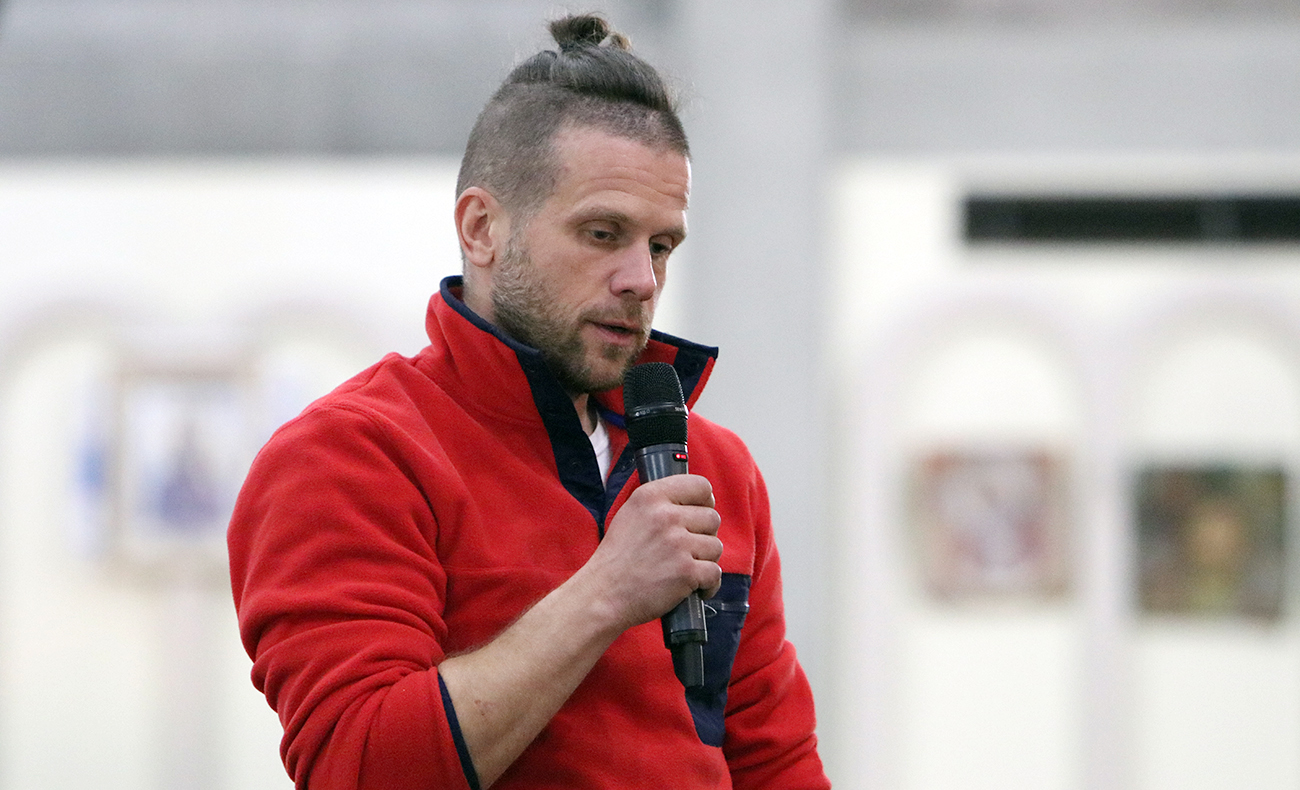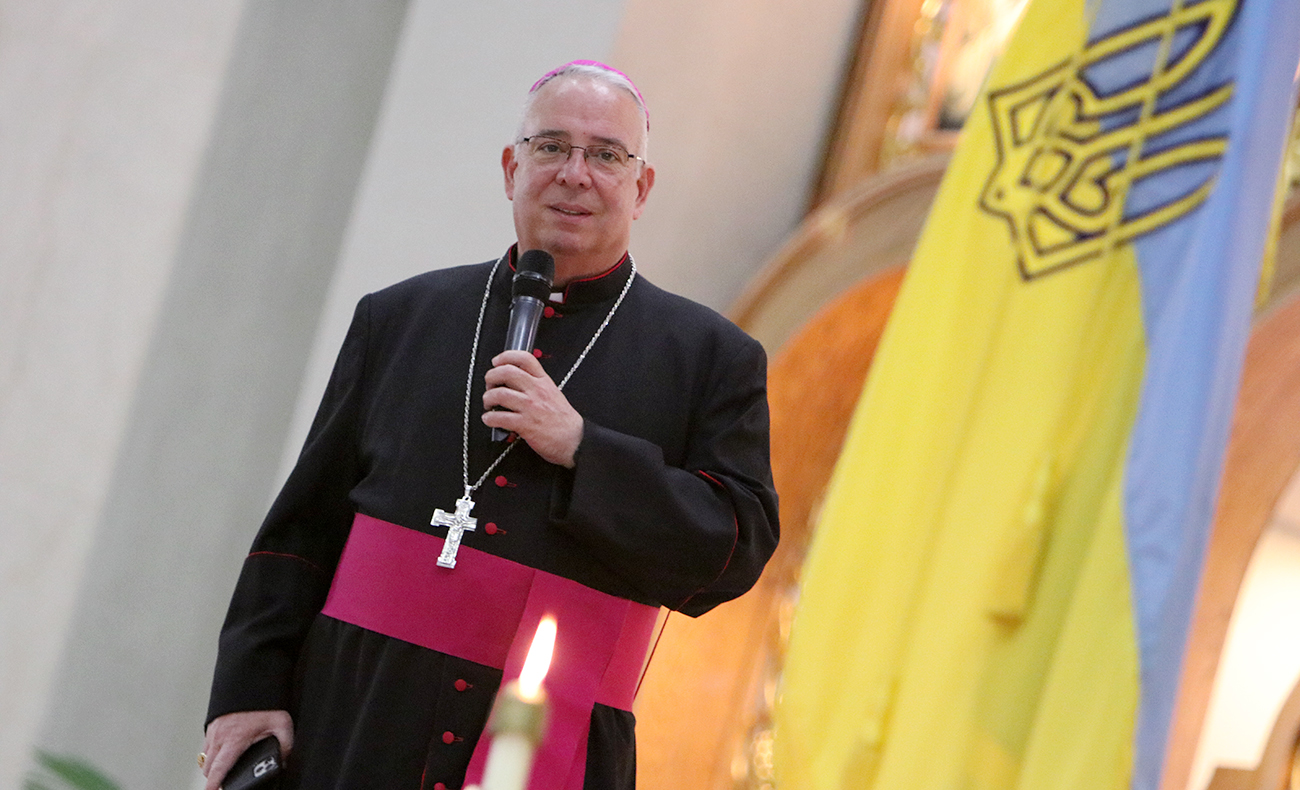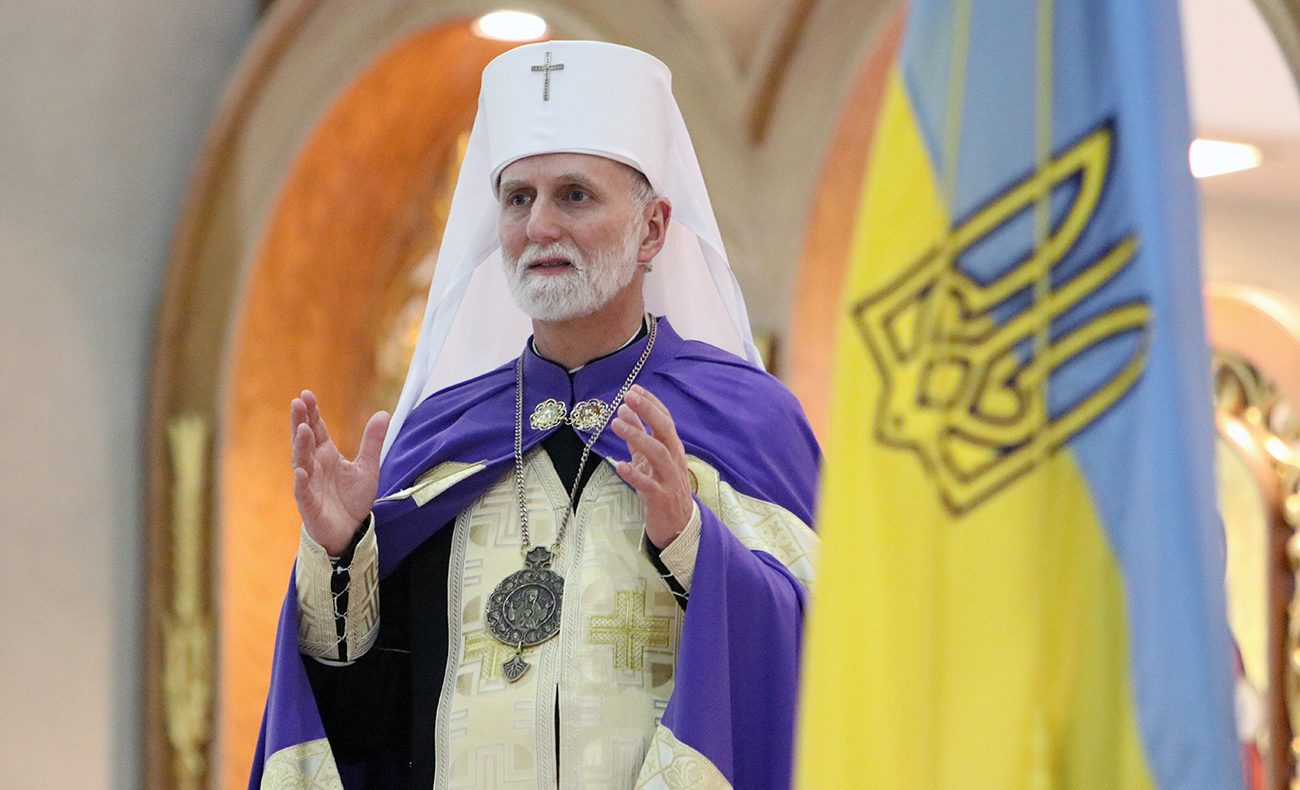Some 175 people gathered this past weekend for a five-hour prayer vigil seeking peace in Ukraine, now in the second week of a full-scale invasion by Russia.
The March 5 services — which included a Divine Liturgy (Byzantine Rite Mass), vespers, reflections and the rosary — took place at the Ukrainian Catholic Cathedral of the Immaculate Conception in Philadelphia.
Presiding at the livestreamed vigil were Archbishop Borys Gudziak of the Ukrainian Catholic Archeparchy of Philadelphia and metropolitan archbishop for all Ukrainian Catholics in the United States, and Archbishop Nelson Pérez of Philadelphia Archdiocese.
[hotblock]
“We pray and … hold hands with the rest of the world in prayer,” said Archbishop Gudziak in his welcoming remarks for the vigil, which was livestreamed in its entirety on the archeparchy’s Facebook page.
Among the Ukrainian Catholic clergy on hand were Immaculate Conception rector Father Roman Pitula, Father Ruslan Borovyi, pastor of St. Nicholas Ukrainian Catholic Church in Philadelphia; and Father Yaroslav Lukavenko of the Ukrainian Catholic Archeparchy of Philadelphia – all natives of Ukraine, with extensive family and friends still in that country. Last week, the three had joined Archbishop Pérez for an Ash Wednesday Mass in honor of Ukraine celebrated at the Cathedral Basilica of SS. Peter and Paul.
The vigil’s homilist and cantor was Father Peter Galadza, retired director of the Metropolitan Andrei Sheptytsky Institute in Toronto and now a fellow at The Catholic University of America.
Auxiliary Bishop Michael Fitzgerald and Auxiliary Bishop John McIntyre of the Philadelphia Archdiocese were also in attendance, along with clergy, religious and faithful from both the archeparchy and the archdiocese.
Archdiocesan Catholic Social Services provided several counselors for participants in need of support amid what Archbishop Gudziak called “a time of trauma … shock … great tumult … (and) great dislocation.”

At a March 5 prayer vigil hosted by the Ukrainian Catholic Cathedral of the Immaculate Conception, Ukrainian native Anatoliy spoke of his sense of helplessness as his parents struggled to escape Ukraine. (Sarah Webb)
Emotions ranging from anger, sorrow, fear, anxiety and even guilt were in evidence during the evening’s Q&A segment, when Archbishop Gudziak invited participants to share personal reflections regarding the invasion.
A young man named Anatoliy admitted he battled a profound sense of frustration and helplessness while his parents struggled to escape Ukraine for Poland and then Switzerland.
“I am deep into this situation psychologically, and attached to the news,” he said.
Father Lukavenko, who arrived in Philadelphia just last summer, said he also wrestles with similar feelings.
“Should I go to Ukraine?” he asked, to which Archbishop Gudziak quickly replied that the priest was needed here, as refugee numbers from that nation “are only going to explode.”
More than 2.5 million have fled Ukraine since the Feb. 24 start of Russia’s full-scale invasion, which has evoked global condemnation. Prior to that, close to 1.5 million were internally displaced by Russia’s 2014 annexation of Crimea and its establishment of two separatist areas, Donetsk and Luhansk, in eastern Ukraine.
European Union officials estimate the total number of refugees — already representing what the UN termed “the fastest growing refugee crisis in Europe since World War II — could climb to seven million.

At a March 5 prayer vigil for Ukraine hosted by the Ukrainian Catholic Cathedral of the Immaculate Conception, Archbishop Nelson Pérez said his own family had been “victims of Russian tyranny,” having fled communist Cuba. (Sarah Webb)
Russia’s invasion of Ukraine shows “the direct experience and the ramifications of the great evil of our fall” as humans, said Archbishop Gudziak, noting that in the garden of Eden “Adam and Eve made (a) grab” to appropriate what was not theirs.
Although “Russia is 28 times as big as Ukraine,” those who act “according to Adam … grab a 29th part,” a sin that “(brings) in … millions,” he said.
At the same time, said Archbishop Gudziak, the world has witnessed “a moral victory” by Ukraine, a David-vs.-Goliath conquest that is “biblical” and “black and white,” since “everybody knows who is true, who is just, who is right” in the situation.
That contrast is underscored by hundreds of thousands “giving everything, (including) their lives” to “defend the innocent, the poor, babies … the aged, the handicapped,” he said. “People are lining up for a project that could kill them.”
[hotblock2]
The struggle is ultimately prefigured in Christ’s passion, said both Archbishop Gudziak and Father Galadza.
In his homily, Father Galadza observed the Ukrainian word for baptism, khreshchennya, “is a word that carries the sense of being immersed in the cross.”
“The Lord has … invited us to enter with him into the reality of the cross … not because he wants us to remain in suffering, but so that we understand whenever we suffer in Christ, there is a resurrection at the end; there is new life,” he said.
Yet the temptation to “fall into the pit of evil, vengeance and resentment” is ever present, particularly when “the people who are trying to kill you apparently seem to know exactly what they’re doing,” said Father Galadza.
Christ remains close to deliver the oppressed from that danger, he said.
“When I am filled with the resurrected Body and Blood of my Lord Jesus Christ, there is nothing … that I cannot do in him,” said Father Galadza. “There is nothing that our brothers and sisters will not be able to accomplish in Ukraine unto the good.”
“We see the courage of people in Ukraine on the front, in the streets, in the homes, in the church, in the subways — people who have faith and believe,” said Archbishop Gudziak. “And in some mystical way, to the whole world, they’re saying, ‘Believe.'”
In his address prior to leading the rosary, Archbishop Pérez – whose parents fled communist Cuba — agreed, saying he and his family were “also victims of Russian tyranny” and had survived its attempts to “crush the human spirit.”
Christ’s triumph over sin and death, and the powerful intercession of Mary, provide well-founded assurance in moments of loss, heartache and injustice, he said.
Archbishop Pérez reiterated the words of a young woman who during the Q&A had declared “the victory was already won at the cross,” then asked for the young woman’s name.
“Anastasia,” said Archbishop Gudziak. “In Greek, it means ‘resurrection.’”
PREVIOUS: St. Gabriel Parish, Norwood leads off 5-week Lenten series
NEXT: Creation care teams getting hands dirty, energizing local parishes



Share this story